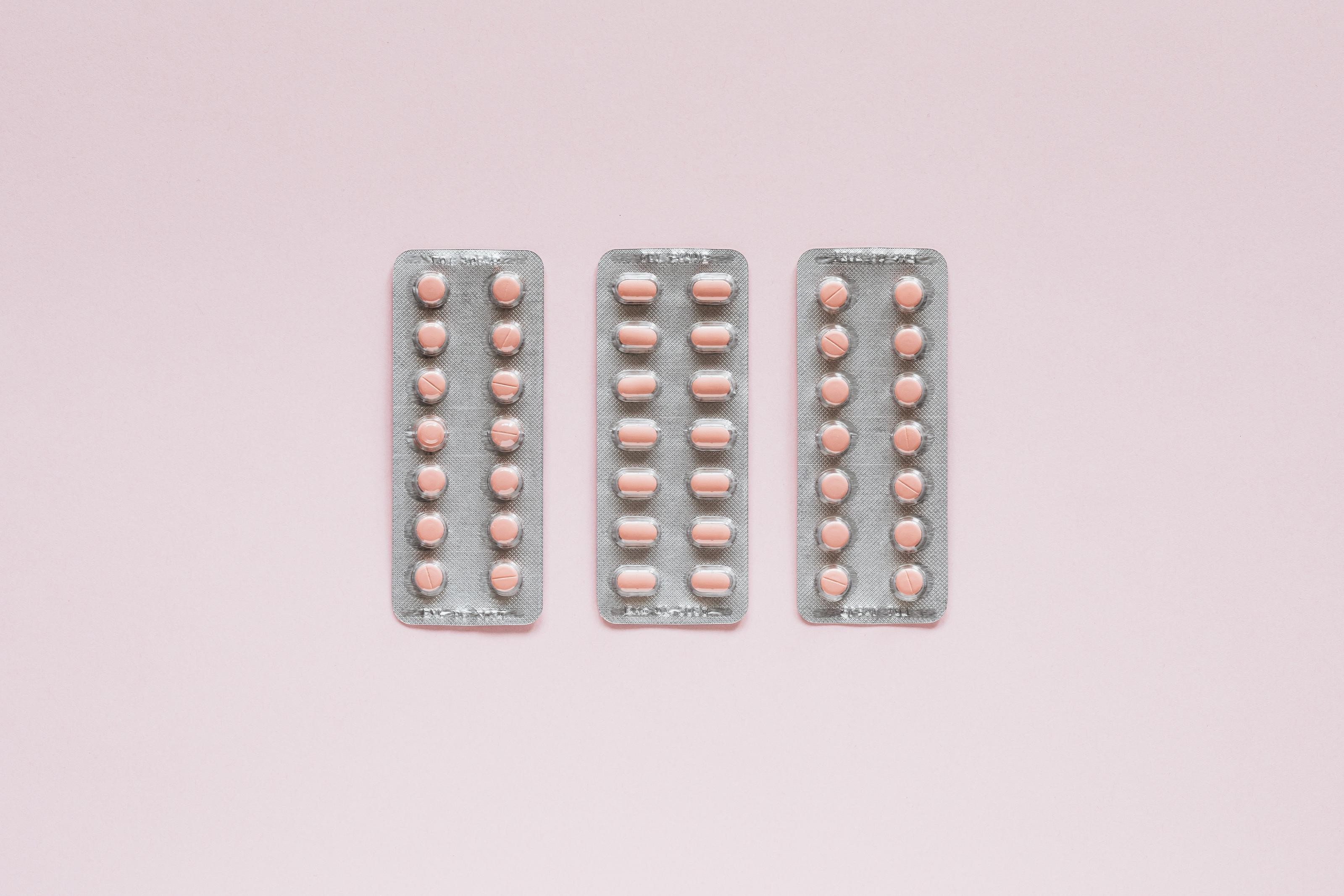It’s time to talk about taking your medicine: America’s medication adherence crisis is a $300 billion problem
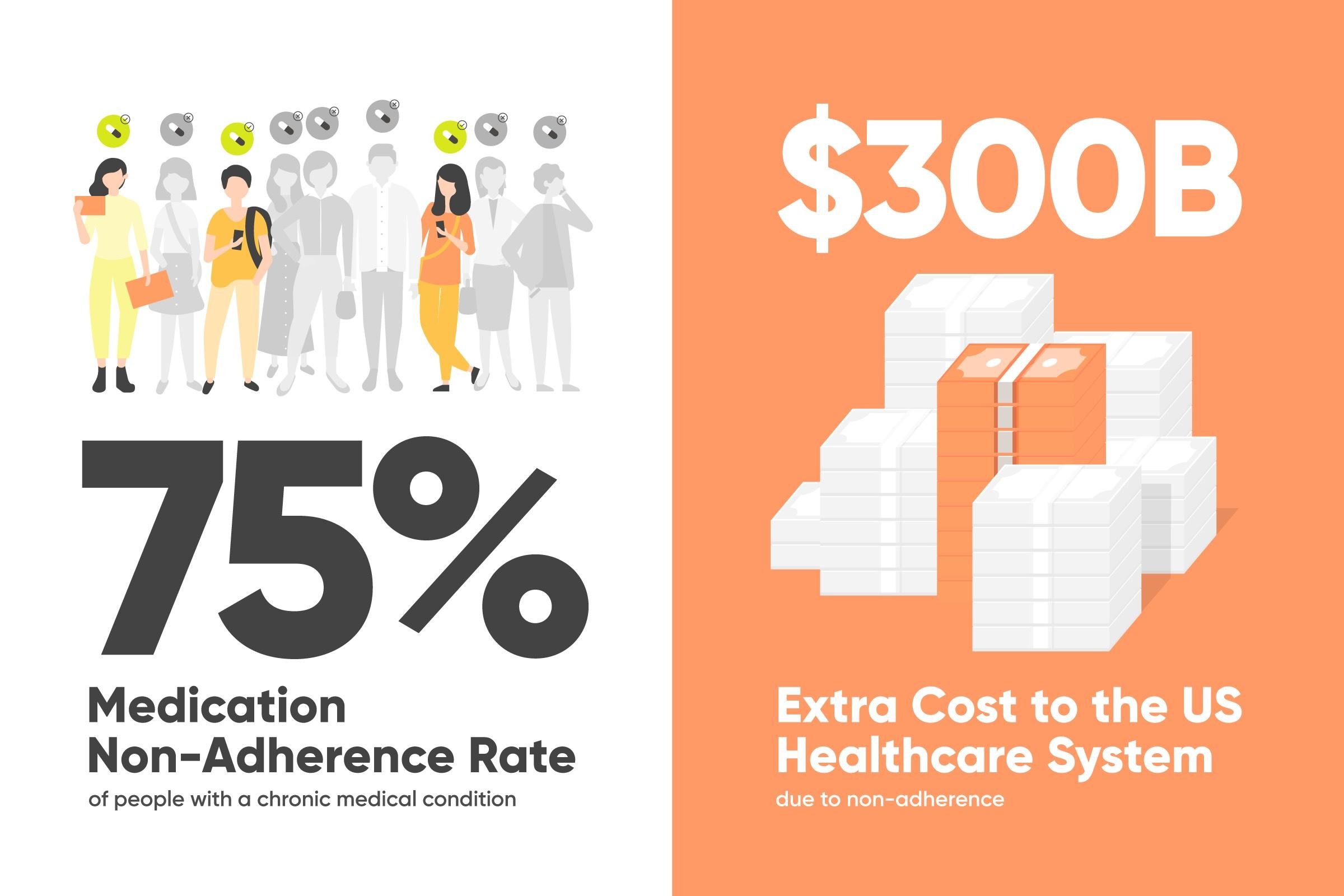
Discover how improving medication adherence can transform the lives of those with chronic diseases. Dive into our insights on strategies that enhance health outcomes and learn about Hero's innovative approach which works to assist users with taking their medications correctly and consistently.
Medication Adherence: Strategies and Impacts
For patients managing a chronic medical condition, day-to-day care can feel like a full-time job. Between juggling doctors’ visits, monitoring health data and maintaining a healthy lifestyle, it’s easy for things like taking daily medication to slip through the cracks. Indeed, medication non-adherence is one of the most widespread health care issues among millions of individuals. It’s also one of the least talked about.
Up to 75% of people with chronic conditions don’t take their medicine as directed—by missing a dose, not refilling their prescription on time or not taking their medication at all. Medication non-adherence results in countless unnecessary negative and sometimes dangerous health outcomes, including rehospitalizations and worse. It also imposes a nearly $300 billion cost on the healthcare system in the U.S.
Understanding why patients do not adhere to their medication regimens is crucial in addressing the issue. Let's delve into the statistics that paint a concerning picture of medication nonadherence in the USA.
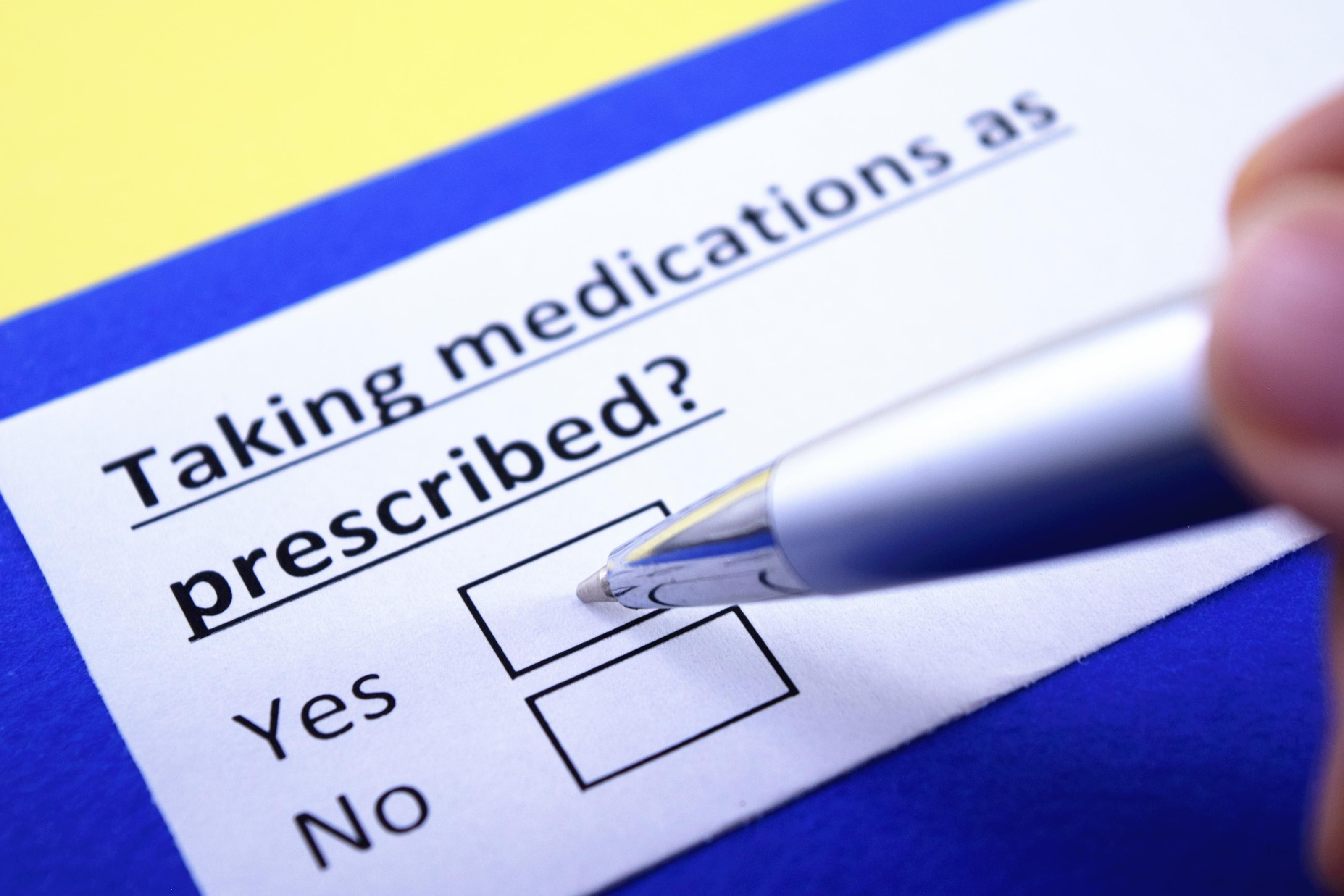
The Alarming Statistics: Understanding Non-Adherence in the USA
Imagine being prescribed medication critical for your health, yet deciding not to take it. This scenario is more common than one might think. Research indicates that about 50% of patients do not take their medications as prescribed. This behavior is particularly prevalent among those with chronic diseases, where medication adherence is essential for disease control and prevention of complications. Here are some startling statistics:
- Approximately 60% of adults reported taking at least one prescription medication, with 36% taking three or more.
- High out-of-pocket costs have led to 8.2% of adults aged 18–64 not taking their medication as prescribed.
- Nonadherence can result in severe health consequences, including treatment failures and an estimated 125,000 deaths per year.
Chronic Diseases and Medication Adherence: A Critical Connection
Chronic diseases require consistent management, often through long-term medication therapy. Poor adherence to these therapies can lead to disease progression and diminished quality of life. For instance:
- In cardiovascular disease, nonadherence to antihypertensive medications can result in uncontrolled blood pressure and increased risk for heart attacks and strokes.
- For individuals with HIV, adherence to antiretroviral therapy is vital for viral suppression and reducing transmission risks.
How Poor Medication Adherence Affects Health Outcomes
Poor medication adherence has a ripple effect on health outcomes and the healthcare system at large. It can lead to:
- Worsening of chronic conditions due to suboptimal disease control.
- Increased hospital admissions and healthcare costs due to complications that could have been prevented with proper medication use.
- A higher burden on health care providers who must address the consequences of nonadherence.
By understanding these aspects, we can begin to develop strategies that tackle the multifaceted issue of medication nonadherence, ultimately aiming to enhance patient care and improve health outcomes across the board.
Complex med schedule? We solved it.
Hero’s smart dispenser reminds you to take your meds and dispenses the right dose, at the right time.
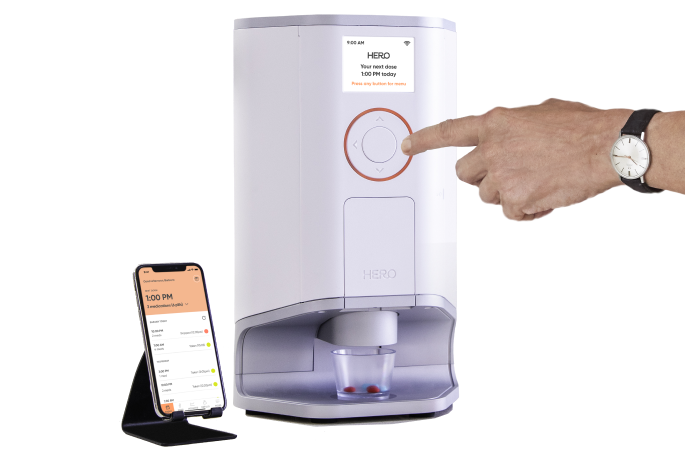
Enhancing Medication Adherence: Multifaceted Approaches for Better Health
Education and Empowerment: The Role of Patient Education in Improving Adherence
Imagine a world where every patient fully understands their health condition and the medications they need to manage it. This is the vision behind patient education as a cornerstone for improving medication adherence. Educating patients goes beyond simply dispensing medications; it involves a comprehensive approach to ensure they understand why adherence is crucial, how to properly take their medications, and the potential consequences of nonadherence. Here are some key points on the role of patient education in enhancing medication adherence:
- Understanding the Impact: Educating patients about the importance of taking medications as prescribed can significantly improve adherence rates. For example, understanding that antihypertensive medications are essential for blood pressure control can motivate patients to adhere to their treatment regimen.
- Empowering Patients: When patients are educated, they feel more empowered to manage their health. This empowerment can lead to improved clinical outcomes and reduced healthcare costs associated with poor medication adherence.
- Addressing Beliefs and Perceptions: Patients' beliefs and perceptions about their medications can influence adherence. By addressing these through education, healthcare providers can help patients overcome barriers and misconceptions that may lead to nonadherence.
Simplifying Treatment: The Impact of Medication Regimens on Patient Compliance
The complexity of medication regimens can be a significant barrier to patient compliance. Simplifying these regimens is a strategic approach to improving medication adherence. Let's delve into some ways simplification can impact patient compliance:
- Reducing Complexity: Simplified medication regimens, such as once-daily dosing or using combination pills, can make it easier for patients to remember and manage their medications, leading to better adherence.
- Customizing Regimens: Tailoring medication regimens to fit into a patient's daily routine can significantly improve adherence rates. For instance, aligning medication times with mealtimes or bedtime can help integrate medicine dispensing into regular daily habits.
- Utilizing Pill Boxes: The use of pill boxes has been shown to organize medication regimens in clear and simple ways, reducing unintentional nonadherence.
Leveraging Technology and Healthcare Teams to Improve Adherence Rates
Technology and collaborative healthcare teams play pivotal roles in improving medication adherence rates. Here's how leveraging these resources can make a difference:
- Electronic Pill Monitors: Devices that remind patients when it's time to take their medication and alert healthcare providers if doses are missed can significantly enhance adherence.
- Team-Based Care: Coordinated care involving pharmacists, nurses, and physicians has been proven effective in increasing patient medication adherence rates. For example, pharmacist-led education combined with collaborative care has led to significant improvements in post-hospitalization medication adherence.
- Text Messaging Interventions: Regular text message reminders have been recommended by the Community Preventive Services Task Force to increase medication adherence among chronic disease patients, demonstrating meaningful improvements in short-term rates.
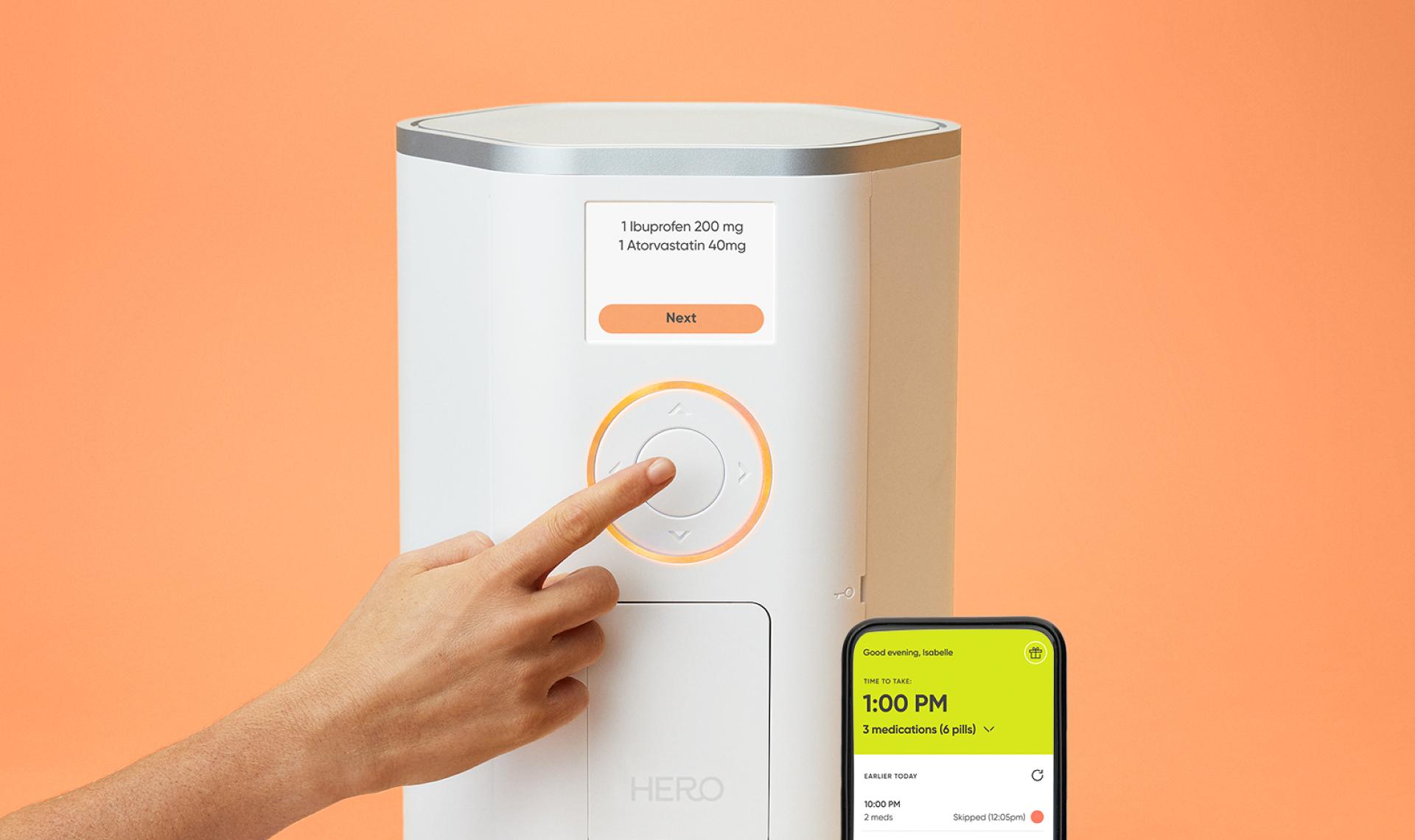
The Hero Solution: Innovating for Improved Medication Management
Imagine a world where managing daily medications is no longer a daunting task for patients with chronic conditions. This is the vision behind Hero, a comprehensive medication management system that is revolutionizing the way individuals adhere to their medication regimens. Here's how Hero is working to transform daily medication management:
How Hero Transforms Daily Medication Management for Patients with Chronic Conditions
For patients juggling multiple prescriptions, the risk of poor medication adherence is high. Hero is working to address this challenge head-on with an intuitive smart medication dispenser tailored for those managing multiple daily medications. The dispenser works to help simplify the process of organizing and administering medications, helping users to confirm that doses are not missed and that patient medication adherence is maintained.
Key features of the Hero system include:
- Automated dispensing of prescribed medications at scheduled times.
- Real-time dosage notifications via a user-friendly app.
- 24/7 customer support for both patients and their caregivers.
By integrating these elements, Hero creates a supportive ecosystem that works to remove the hassles of medication management, assisting patients as they take control of their health outcomes.
Integrating Hero into Healthcare Systems for Enhanced Patient Care and Outcomes
The integration of Hero into healthcare systems offers an avenue for enhancing patient care and outcomes. With Remote Therapeutic Monitoring (RTM) now covered by Medicare Part B, healthcare providers have an opportunity to leverage digital technologies like Hero to gain greater insights into non-physiologic health data, including medication use and adherence.
Healthcare professionals may benefit from the following:
- Increased visibility into patient adherence patterns.
- The ability to work with patients to intervene proactively when nonadherence is detected.
- Improved coordination between different members of health care teams.
The positive impact of this kind of technology cannot be overstated: Among those who use the Hero system, medication adherence rates have reached 95%.
Hero will continue to work at finding ways to improve medication adherence among patients with chronic conditions. By helping users simplify daily routines and providing valuable insights to health care providers, Hero hopes to make a significant impact on public health and healthcare costs associated with nonadherence.
The contents of the above article are for informational and educational purposes only. The article is not intended to be a substitute for professional medical advice, diagnosis, or treatment. Always seek the advice of your physician or other qualified clinician with any questions you may have regarding a medical condition or its treatment and do not disregard professional medical advice or delay seeking it because of information published by us. Hero is indicated for medication dispensing for general use and not for patients with any specific disease or condition. Any reference to specific conditions are for informational purposes only and are not indications for use of the device.



